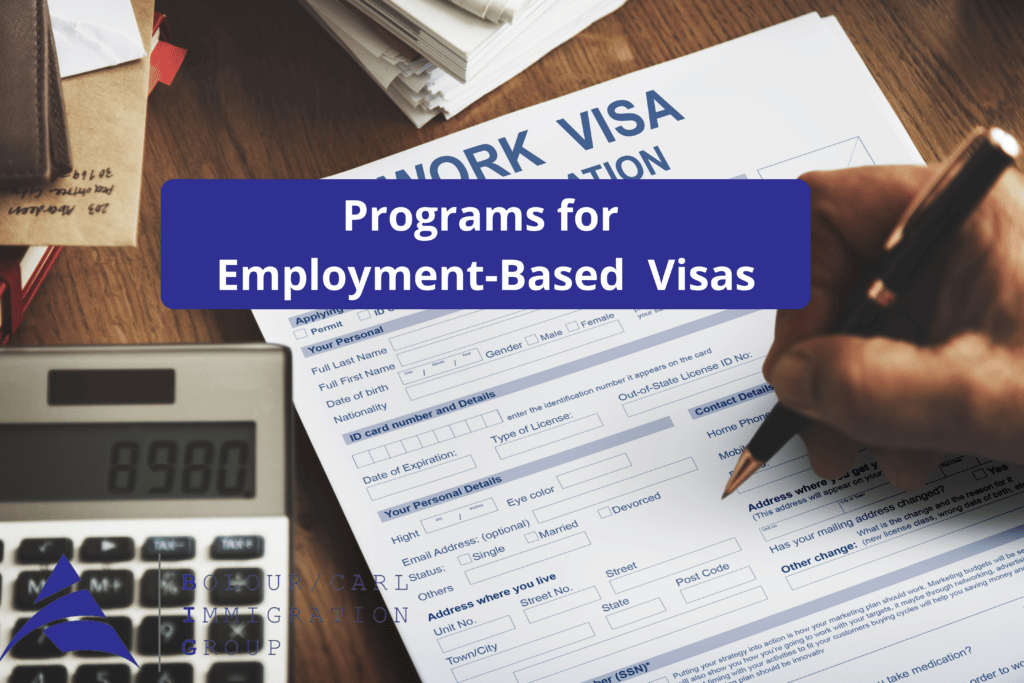
If you are interested in working temporarily in the United States, you may be able to obtain a temporary work visa. Several employment-based nonimmigrant visa programs allow eligible foreign nationals who are sponsored by a qualified employer to work in the United States for a fixed, finite period of time. Below is an overview of some of the most popular programs.
H-1B: Individuals in Specialty Occupations
If you have highly specialized skills and at least a bachelor’s degree in your field, you may be a candidate for an H-1B visa. This program allows U.S. employers to hire foreign national workers to temporarily fill specialty positions that they struggle to fill domestically. H-1B specialty occupations include architecture, engineering, mathematics, information technology, physical sciences, social sciences, health care, education, business specialties, accounting, law, theology, and the arts. For a position to be eligible, it must require the services of an employee who has a bachelor’s degree or higher in a field related to the position.
H-1B visas are valid for up to three years. They can be extended, but the total period generally cannot exceed six years.
More than 200,000 employer applications are typically received annually for H-1B visas, which are capped at 85,000 spots each year, with 20,000 of the spots reserved for foreign graduates of U.S. advanced degree programs (master’s or higher). With demand far outstripping supply, applications are chosen by lottery.
H-2A: Temporary Agricultural Workers
If you would like to come to the United States to do seasonal or temporary farm work, you may be eligible for an agricultural visa through the H-2A visa program. Agricultural employers often need to scale up their labor force during growing or harvest season and they often struggle to find domestic workers who are available on a temporary basis. Farms, ranches, nurseries, and orchards also often need temporary workers for projects that are not seasonal in nature. These employers must be able to demonstrate that they cannot find U.S. workers to perform the work.
The maximum period of stay in the H-1A classification is three years. To be eligible for this program, you must be a national of an eligible country, as designated by the Department of Homeland Security. There are currently 81 countries on the approved list.
H-2B: Temporary Nonagricultural Workers
The H-2B program allows U.S. employers to bring workers aboard for temporary positions not related to farming. Typical H-2B employers include resorts, landscapers, and fisheries. Employers must show that the worker is needed for a one-time project or for seasonal or intermittent work and that they are unable to fill the position with a U.S. worker.
Similar to the H-2A visa program, the maximum period of stay in this category is three years, and you must come from one of the countries on the approved countries list. The H-2A and H-2B country lists are nearly identical.
The H-2B visa program is typically capped at 66,000 visas per year. The Department of Homeland Security announced in April 2021 that it would make 22,000 additional visas available ahead of the busy summer season to meet increased demand.
O-1: Individuals with Extraordinary Ability or Achievement
If you have “extraordinary ability” in the arts, athletics, sciences, education or business, or you have been recognized nationally or internationally for achievements in the motion picture or television industry, you may be able to obtain an O-1 visa. To be approved, an O-1 visa petition must include evidence of your extraordinary ability, such as internationally recognized prizes or written opinions from labor groups or other recognized experts in the field. Individuals who will accompany an O-1 artist or athlete to assist in a specific event may be eligible for an O-2 visa. O visas are available for up to three years initially and could be extended in yearly increments.
P-1: Artists and Entertainers
P-1 visas are intended for athletes and members of an entertainment group to come to the United States for particular athletic competitions or performances. The P-1A visa is specifically for athletes, whether individual or part of a team; coaches and other essential support personnel are eligible, as well. P-1B visas are for entertainers who are coming to the United State to perform as part of a group (note: this visa does not apply to individual entertainers). While the standards are less rigorous than they are for O-1 visas, P-1 visas nonetheless require the athlete or entertainment group to have an internationally recognized level of sustained performance. The league or tournament that P-1A athletes will be participating in must also be at an esteemed level that is recognized internationally.
For individual athletes, P-1 visas can be valid for up to five years initially and can be extended for a total stay of 10 years. For athletic and entertainment groups, P-1 visas are available in increments of up to one year.
L-1: Intracompany Transferees
L-1 visas allow qualified U.S. employers to transfer executives and managers (L-1A) or professional employees with specialized knowledge (L-1B) from an affiliated foreign office to one of its U.S. offices. If the company does not have a U.S. office, it can send an executive or manager with an L-1A visa to establish one. The maximum initial stay is three years, or one year if the visa holder is coming to establish an office. L-1A employees can extend their visas for a maximum stay of seven years.
Family Members
With each of the aforementioned nonimmigrant visa categories, spouses and unmarried children under age 21 may apply for nonimmigrant visas to accompany you. The visas for both you and your family members will be valid for the length of the work assignment, up to the maximum period allotted per visa category.
Employment-Based Visa Application Process
For each of these visas, a qualified employer must submit a petition with U.S. Citizenship and Immigration Services (USCIS) on your behalf, using Form I-129, Petition for a Nonimmigrant Worker, and include supporting documentation. Different visas have additional requirements for employers. For the H-1B visa, for instance, the employer must file a labor condition application (LCA) with the Department of Labor (DOL), while H-2A and H-2B visas require that temporary labor certification applications be filed with the DOL.
Next Steps
If USCIS approves the petition, your prospective employer will be notified, and you will be told to apply for your visa using Form DS-160, Online Nonimmigrant Visa Application. In nearly all cases, you will also need to schedule an interview with a U.S. Consulate or Embassy in your country. Wait times for interview appointments vary by location, season and visa category.
Bolour/Carl Immigration Group is a full-service immigration law firm. If you would like to speak to a n employment-based visa lawyer, contact us at 323-857-0034 or [email protected].




